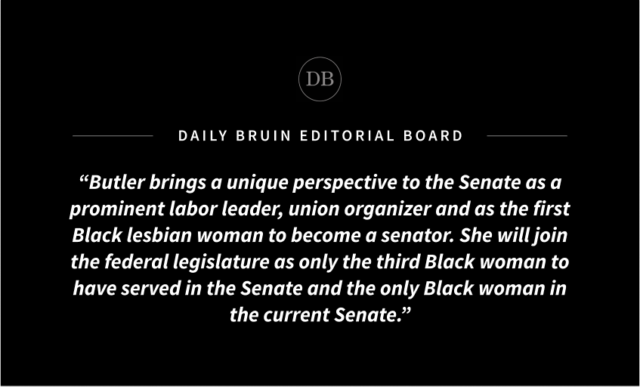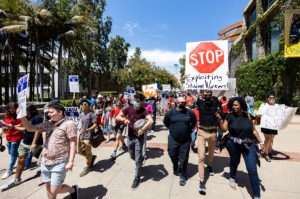This post was updated Oct. 24 at 9:55 p.m.
Long before she arrived in the United States Senate, Laphonza Butler was making history.
Butler, originally from Mississippi, began a lengthy and storied career as a labor organizer after graduating from Jackson State University in 2001.
After moving to California in 2009, Butler served in several roles as part of the Service Employees International Union. She eventually became president of SEIU Local 2015, the largest union in California, which represented over 300,000 care workers at the time. As president of this new union, Butler championed the successful movement to institute a $15 minimum wage in California.
In 2021, she became the first woman of color to serve as the president of the political fundraising organization Emily’s List, helping to secure several critical Democratic victories in the 2022 election cycle.
On Oct. 1, Butler was appointed to one of California’s two seats in the Senate by Gov. Gavin Newsom following the death of Sen. Dianne Feinstein.
While she announced her intention not to run for the Senate seat in the upcoming 2024 elections last Thursday, Butler will remain one of California’s most influential voices in the federal government until a new senator is elected.
Butler brings a unique perspective to the Senate as a prominent labor leader, union organizer and as the first Black lesbian woman to become a senator. She will join the federal legislature as only the third Black woman to have served in the Senate and the only Black woman in the current Senate.
While her rise to the Senate has already been monumental, Californians will have to see what kind of history Butler will make in her new office, whether through legislative initiatives or by appointing judges to the federal courts as part of the Senate Judiciary Committee.
One facet of her career worth examining in greater detail, however, is her tenure as a UC regent from 2018 to 2021. Butler was appointed by former Gov. Jerry Brown to a 12-year term on the UC Board of Regents but only served three years of that term before joining Emily’s List.
Exploring Butler’s time as a regent not only demonstrates her impact on the experiences of UC students across the state but may also shed some light on her approach to governance as a senator.
As a regent, Butler served as the vice chair of both the Academic and Student Affairs Committee and the Compliance and Audit Committee. According to a resolution passed by the regents on her retirement from the board, she played an important role in coordinating the UC’s early response to COVID-19 and served as the chair of a working group focused on Proposition 16, a ballot initiative for the 2020 election intended to repeal Proposition 209’s ban on affirmative action in California.
She was also a critical advocate for the UC system’s suspension of the use of standardized testing in admissions, which culminated in a May 2020 vote by the regents to suspend the requirement of SAT and ACT scores in UC applications until 2024. The regents later made the change permanent in November 2021 after Butler’s resignation from the board.
Butler was also one of six regents to vote against tuition increases for nonresident undergraduate students in 2019 and one of five regents to oppose the tuition increases for all undergraduate students in 2021.
While both tuition hikes were ultimately passed, Butler’s opposition – along with her other initiatives as a regent – highlights her commitment to making the university system more accessible, especially for first-generation students, low-income students and students of color.
On the other hand, Butler’s appointment to the Senate seat has also been controversial among some sectors of the labor movement and elsewhere in California.
In particular, critics have noted her joining Airbnb as its director of public policy and campaigns and her consulting work with Uber during the rideshare company’s campaign for Proposition 22, which prevented gig workers from being classified as paid employees.
Airbnb has received a great deal of criticism for its role in rising rent prices across the country and its use by landlords to circumvent local housing regulations and anti-discrimination laws, which continues despite the company’s efforts.
In 2019 and 2020, Butler worked as a consultant at SCRB Strategies, advising Uber and serving as a contact between the company and California unions while labor activists organized in the state to pass Assembly Bill 5, according to a Politico report.
That bill would have provided employee benefits and other protections to gig workers at companies such as Uber, Lyft and DoorDash, which were exploiting loopholes in employment law to avoid classifying their workers as employees instead of private contractors.
In response, these tech giants organized a campaign costing more than $200 million to neuter the new law through Proposition 22, an ultimately successful ballot initiative that exempted gig workers from the law’s protections.
California public records show that Uber paid SCRB Strategies over $185,000 for Butler’s consulting work and other lobbying efforts during the campaigns for Assembly Bill 5 and Proposition 22, according to Politico.
Butler’s controversial work for these tech giants paints the new senator in a less flattering light. The decision by Newsom to appoint Butler as senator has also undergone a great deal of scrutiny from labor advocates, especially given his recent controversial vetoes on several bills that the California labor movement strongly supported.
Regardless, Butler’s appointment to the seat remains a major milestone for California and the nation. Whether she will effectively represent the interests of Californians in Congress is still a question left unanswered.
But if her work toward the $15 minimum wage and her time as a UC Regent are any indication, she has the potential to make true progress in the upper chamber of Congress.






Comments are closed.